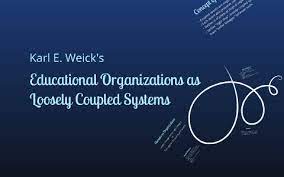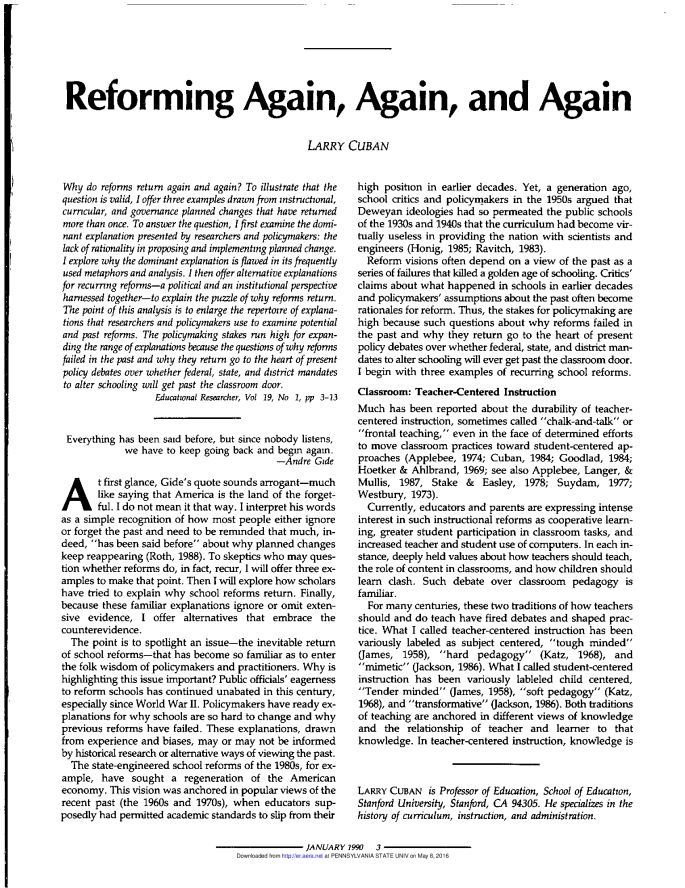This post is a discussion of Karl Weick’s classic essay, “Educational Organizations as Loosely Coupled Systems,” which was published in Administrative Science Quarterly in 1976. Here’s a link to the original. The essay begins with this wonderful thought experiment: Imagine that you’re either the referee, coach, player or spectator at an unconventional soccer match: the field for the game … Continue reading Educational Organizations as Loosely-Coupled Systems
Category: School organization
Educational Organizations as Loosely Coupled Systems
This post is a discussion of Karl Weick's classic essay, "Educational Organizations as Loosely Coupled Systems," which was published in Administrative Science Quarterly in 1976. Here's a link to the original. The essay begins with this wonderful thought experiment: Imagine that you're either the referee, coach, player or spectator at an unconventional soccer match: the … Continue reading Educational Organizations as Loosely Coupled Systems
Larry Cuban — Reforming Again, Again, and Again
This blog post is a classic essay by Larry Cuban that explores the perennial problem of why efforts to reform schools in the US are steady work. Why do we keep trying to make the same reforms, over and over again, with only minimal success? The essay was published in Educational Researcher in 1990. Here's … Continue reading Larry Cuban — Reforming Again, Again, and Again
The Problem of Public Schools in a Liberal Democracy: Insights from Albert Hirschman’s “Exit, Voice, and Loyalty”
Exit, Voice, and Loyalty – a book you can't get out of your head – was written Albert Hirschman, a political economist and total mensch (read his obituary). I find his framework is immensely useful in thinking about schools. The core argument is that political and economic organizations are responsive to different kinds of customer … Continue reading The Problem of Public Schools in a Liberal Democracy: Insights from Albert Hirschman’s “Exit, Voice, and Loyalty”
Larry Cuban — Rockets Are Complicated but Schools Are Complex; Thoughts about Educational Exceptionalism
In this post, I want to explore a vivid image developed by Larry Cuban to characterize the peculiar nature of teaching and learning in schools. Scholars have frequently argued for a form of educational exceptionalism that sees schooling as a social structure that is distinctive from the normal patterns of bureaucratic organization that one sees … Continue reading Larry Cuban — Rockets Are Complicated but Schools Are Complex; Thoughts about Educational Exceptionalism
Two Cheers for School Bureaucracy
This post is a piece I wrote for Kappan, published in the March 2020 edition. Here's a link to the PDF. Bureaucracies are often perceived as inflexible, impersonal, hierarchical, and too devoted to rules and red tape. But here I make a case for these characteristics being a positive in the world of public education. … Continue reading Two Cheers for School Bureaucracy
Michael Katz — Alternative Forms of School Governance
This post is my reflection on a classic piece by my former advisor, Michael Katz. It's a chapter in Class, Bureaucracy, and Schools called "Alternative Proposals for American Education: The Nineteenth Century." Here's a link to a PDF of the chapter. The core argument is this. In American politics of education in the 19th century, … Continue reading Michael Katz — Alternative Forms of School Governance



